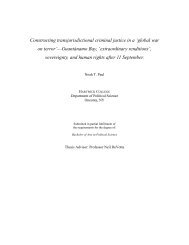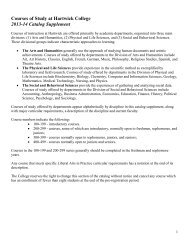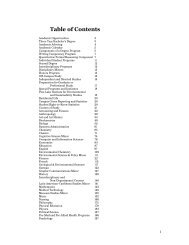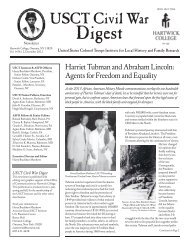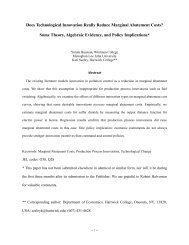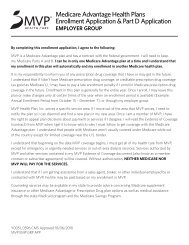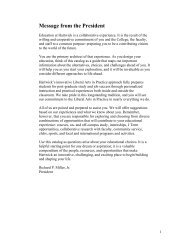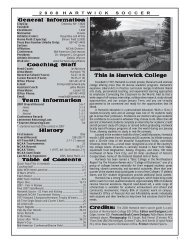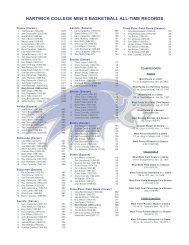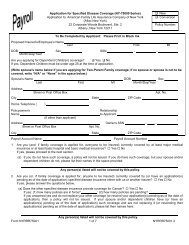Table of Contents - Hartwick College
Table of Contents - Hartwick College
Table of Contents - Hartwick College
You also want an ePaper? Increase the reach of your titles
YUMPU automatically turns print PDFs into web optimized ePapers that Google loves.
and their moons. Hands-on lab activities (some <strong>of</strong> them outdoors) explore<br />
the size <strong>of</strong> the solar system, the role <strong>of</strong> plate tectonics and volcanism in<br />
the development <strong>of</strong> moons and planets, and the possibility <strong>of</strong> discovering<br />
life on other worlds. Offered during January Term.<br />
205 Paleontology (4 credits, 2 two-hour classes weekly) Introduction to<br />
the morphology, paleontology and evolution <strong>of</strong> fossil organisms with<br />
emphasis on the invertebrates. (LAB)<br />
206 Mineralogy (4 credits, 3 one-hour lectures plus one 3 hour lab<br />
weekly, one weekend field trip). Physical properties, chemical properties,<br />
crystal structure, and geological occurrences <strong>of</strong> minerals. Introduction to<br />
optical properties <strong>of</strong> minerals and modern techniques <strong>of</strong> identifying and<br />
analyzing mineral chemistry, structure and surface properties. Offered<br />
alternate years. Prerequisites: Introductory geology course and Chem 107<br />
or permission <strong>of</strong> instructor.<br />
275 Off-Campus Field Studies (4 credits, January Term) Field trips<br />
include study <strong>of</strong> the geology, geography, and natural history <strong>of</strong><br />
destinations such as the Bahamas, Hawaii, Texas, and Switzerland. All<br />
aspects <strong>of</strong> Earth Science may be covered during these trips including<br />
surficial geology, geomorphology, sedimentology, petrology, mineralogy,<br />
structural geology, climatology, hydrology, and geochemistry. These trips<br />
<strong>of</strong>fer exceptional opportunities to practice field techniques in all areas <strong>of</strong><br />
geology. Prerequisite: Permission <strong>of</strong> instructor. Physical Geology (107) is<br />
strongly recommended.<br />
288 Geomorphology (3 credits, 5 two-hour lectures weekly, January<br />
Term) A study <strong>of</strong> the classification and development <strong>of</strong> landforms. The<br />
landforms <strong>of</strong> various climatic belts will be discussed and compared.<br />
Particular attention will be paid to glacial geomorphology including a<br />
general discussion <strong>of</strong> glacial and Pleistocene paleoclimatology.<br />
302 Surficial Geology (4 credits, 2 two-hour classes weekly) This<br />
course focuses on the modern environmental science <strong>of</strong> the Earth’s<br />
surface. Many <strong>of</strong> the environmental problems faced by a technological<br />
society involve surface geological materials. The course addresses the<br />
needs <strong>of</strong> the geology student preparing for a career in the environmental<br />
sciences. The course emphasizes major elements <strong>of</strong> glacial geology and<br />
soils science. In addition, there is considerable discussion <strong>of</strong> geological<br />
engineering problems associated with erosion and unstable slopes.<br />
305 Groundwater Hydrology (4 credits, 3 one-hour lectures weekly.<br />
One three-hour lab weekly) The course covers the geological and physical<br />
aspects <strong>of</strong> hydrology. Study <strong>of</strong> the hydrologic budget, hydraulics and<br />
material properties <strong>of</strong> geologic materials are integrated to develop the<br />
concepts <strong>of</strong> groundwater formation and movement. Groundwater<br />
contaminant transport and treatment are introduced. Use <strong>of</strong> practical<br />
problem solving techniques with quantitative methods is stressed. Offered<br />
alternate years. Prerequisites: Math 233 or permission <strong>of</strong> instructor.<br />
(LAB)<br />
307 Petrology (4 credits, 3 one-hour lectures, 1 three-hour lab weekly,<br />
weekend field trip) The origin, classification and interpretation <strong>of</strong> igneous<br />
and metamorphic rocks. Emphasis on tectonic settings and processes by<br />
which various rock types form, and the study <strong>of</strong> origins and evolution <strong>of</strong><br />
rock suites through observation, chemical analysis, basic thermodynamics<br />
and phase diagrams. Laboratory emphasizes thin section and hand<br />
132



